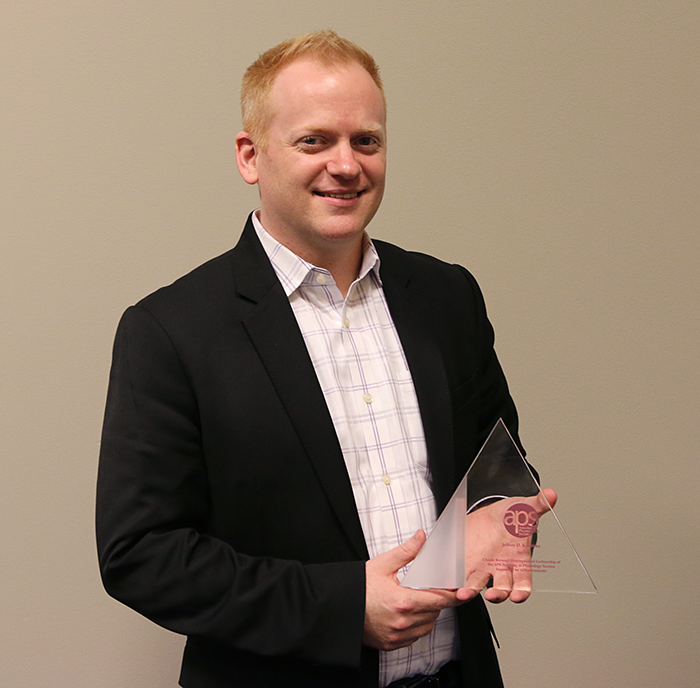Each year, ADInstruments partners with the APS to offer the Claude Bernard Distinguished Lectureship Award. The award is presented to an established investigator with a history of excellence in education, who is making outstanding contributions to teaching and learning.
This year's winner is Jeffrey Karpicke Ph.D., who is the James V. Bradley Associate Professor of Psychological Sciences at Purdue University (Indiana, USA). Jeffrey was presented the award by Tony McKnight at the recent international Experimental Biology meeting in Chicago. 
Jeffrey’s research interests include human learning and memory, cognitive science and education, learning and cognitive strategies in children, and educational technology. He is the Principal Investigator of the Cognition and Learning Laboratory at Purdue University which conducts basic and applied research on how people learn.
We talked to Jeffrey following his award win:
What does the award mean for you?
One of our objectives is to try to communicate what we are doing to other educational communities and I feel that the medical science world - particularly the anatomy and physiology community - have been especially interested and receptive. It’s very humbling and a great honor, and it makes me feel like we are on the right track.
Tell us a little about your field of research:
Our research is on retrieval-based learning. That is the effect of practicing actively retrieving knowledge on how people learn. Speaking broadly, students don’t tend to do that on their own! Students are more likely to engage in passive activities like passive repetitive reading. My talk at EB was a little about the effective ways that an instructor can guide learners to engage in retrieval. The good thing is that as soon as you talk about how people learn it naturally forms a lot of questions and people get quite interested and attached to that.
So our lab has been working on developing technologies to encourage students to practice retrieval. There are published studies that show proof of concept that retrieval based activities are effective for helping people learn about anatomy terms and concepts and how things function. We look at this information and then ask, "How can we make it even better?”
In terms of technology, my field is changing. We’ve been working at the college level and also with elementary schools to figure out what are some computer programs that could guide learners to practice retrieval. We can now do a lot more data collection on the internet that we could even five years ago. The major change, technology-wise for us is that we are writing computer programs to run our studies instead of running stand-alone little desktop apps that we run in our lab, we’ve had to learn how to do web-based programming and to write data to databases. And that’s been huge. That’s in my lab but I think that cognitive psychology is looking for new ways to collect raw data, and this is a great way to do it.
What’s the best part of your work?
I work with a great team of post-doctoral researchers and graduate students and undergraduate students. We have our own group of undergraduate computer students who we work with too. I’ve been at Purdue University for 10 years now and we’ve just gotten the 100th undergraduate coming through our lab. So it feels like a milestone for me - having 100 undergraduates work in our lab, it’s great. They are critical for helping us achieve what we want to do. So that’s the best part - working with a great bunch of students and trainees. They keep me going. They’re really excited about what we’re doing and about taking us in new directions!
Congratulations Jeffrey, from all of us at ADInstruments!
